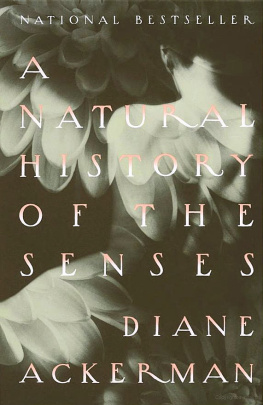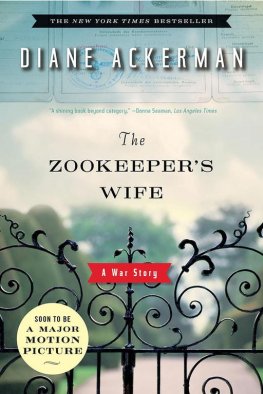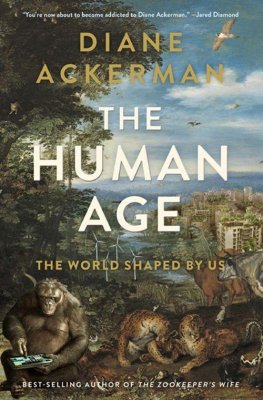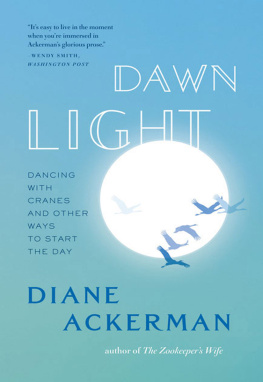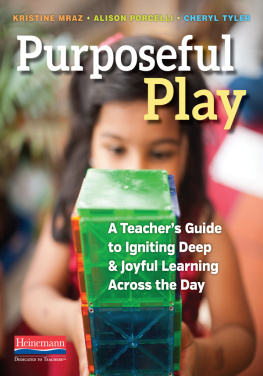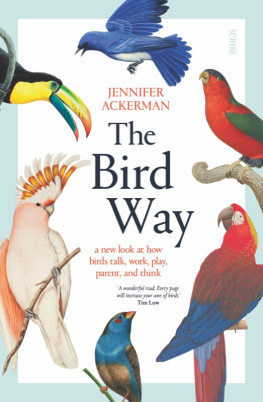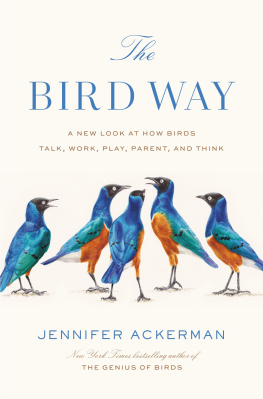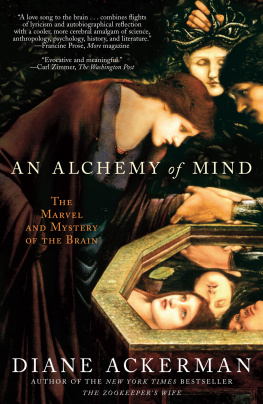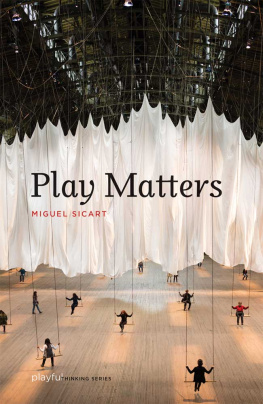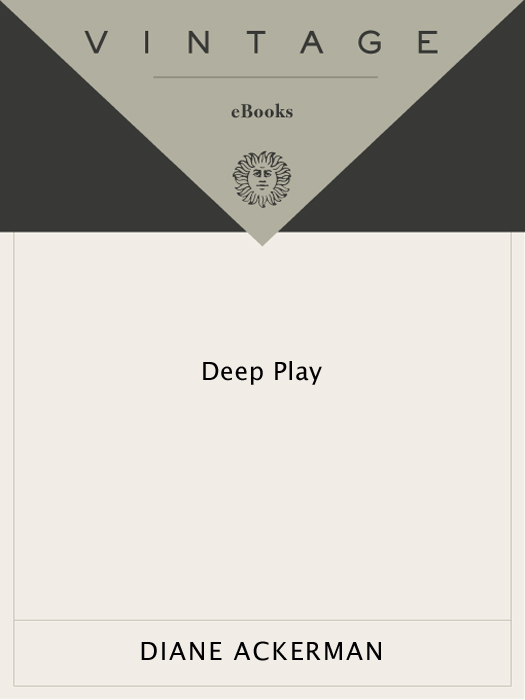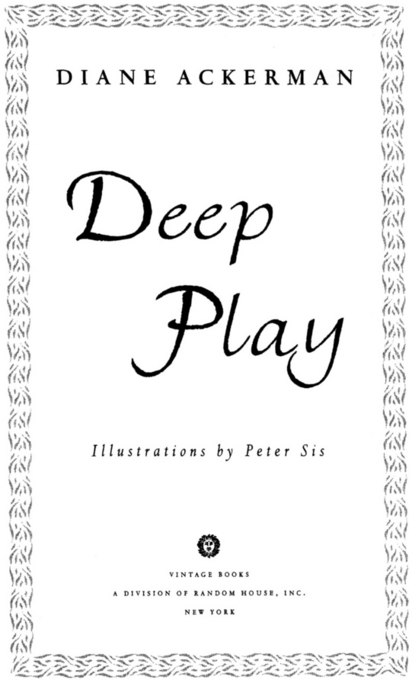DIANE ACKERMAN
Deep Play
Poet, essayist, and naturalist, Diane Ackerman was born in Waukegan, Illinois. She received an M.A., M.F.A., and Ph.D. from Cornell University. Her poetry has been published in many leading literary journals, and in the books The Planets: A Cosmic Pastoral; Wife of Light; Lady Faustus; Reverse Thunder: A Dramatic Poem; Jaguar of Sweet Laughter: New And Selected Poems; and I Praise My Destroyer. Her works of nonfiction include Deep Play; A Slender Thread; The Rarest of the Rare; A Natural History of Love; The Moon by Whale Light and Other Adventures Among Bats, Crocodilians, Penguins, and Whales; A Natural History of the Senses; and On Extended Wings, a memoir of flying. Her bestselling A Natural History of the Senses was the basis for a PBS television series, Mystery of the Senses, in which she was featured as host and narrator. She is also writing a series of books for children, the first two of which are Monk Seal Hideaway and Bats: Shadows in the Night, and she is co-editor, with Jeanne Mackin, of an anthology, The Book of Love.
Ms. Ackerman has received the Academy of American Poets Lavan Award, and grants from the National Endowment for the Arts and the Rockefeller Foundation, among other recognitions. Honored as a Literary Lion by the New York Public Library, she has taught at several universities, including Columbia, Cornell, William & Mary, and Ohio University. Her essays about nature and human nature have appeared in National Geographic, The New Yorker, The New York Times, Parade, and other journals.
BOOKS BY D IANE A CKERMAN
I Praise My Destroyer
A Slender Thread
The Rarest of the Rare
A Natural History of Love
A Natural History of the Senses
The Moon by Whale Light
Jaguar of Sweet Laughter
Reverse Thunder
On Extended Wings
Lady Faustus
Twilight of the Tenderfoot
Wife of Light
The Planets: A Cosmic Pastoral
FOR CHILDREN
Monk Seal Hideaway
Bats: Shadows in the Night
ANTHOLOGY
The Book of Love
(with Jeanne Mackin)
FIRST VINTAGE BOOKS EDITION, AUGUST 2000
Copyright1999 by Diane Ackerman
Illustrations copyright 1999 by Peter Sis
All rights reserved under International and Pan-American Copyright Conventions. Published in the United States by Vintage Books, a division of Random House, Inc., New York, and simultaneously in Canada by Random House of Canada Limited, Toronto. Originally published in hardcover in the United States by Random House, Inc., New York, in 1999.
Grateful acknowledgment is made to the following for permission to reprint previously published material:
Farrar, Straus & Giroux, Inc.: Brief excerpts from A Native Hill and The Body and the Earth from Recollected Essays, 19651980 by Wendell Berry. Copyright 1981 by Wendell Berry. Reprinted by permission of North Point Press, a division of Farrar, Straus & Giroux, Inc.
Henry Holt and Company, Inc. and Random House UK: Eight lines from Two Tramps in Mud Time from The Poetry of Robert Frost edited by Edward Connery Lathem. Copyright 1936 by Robert Frost. Copyright 1964 by Lesley Frost Ballantine. Copyright 1969 by Henry Holt & Company. Rights throughout the British Commonwealth are controlled by Random House UK. Reprinted by permission of Henry Holt and Company, Inc., and Random House UK.
International Work Group for Indigenous Affairs: Excerpt from Document 54, Land Rights Now by Gulawarrwuy Yunupingu and Silas Roberts. Reprinted by permission of International Work Group for Indigenous Affairs, Copenhagen, Denmark.
Brother Joseph Keenan: Excerpt from The Art of Taking Tea by Brother Joseph Keenan. Reprinted by permission.
Alfred A, Knopf, Inc.: Excerpt from page 109 of Lyrical and Critical Essays by Albert Camus, translated by Ellen Conroy Kennedy. Copyright 1968 by Alfred A. Knopf, Inc. Reprinted by permission of the publisher.
New Directions Publishing Corporation and David Higham Associates Limited: Three lines from Fern Hill from The Poems of Dylan Thomas. Copyright 1945 by The Trustees for the copyrights of Dylan Thomas. Rights throughout the world, excluding the United States, are controlled by David Higham Associates Limited. Reprinted by permission of New Directions Publishing Corporation and David Higham Associates Limited.
Random House, Inc.: School Prayer from I Praise My Destroyer by Diane Ackerman. Copyright 1998 by Diane Ackerman. Reprinted by permission of Random House, Inc.
Vintage and colophon are registered trademarks of Random House, Inc.
The Library of Congress cataloged the Random House edition as follows:
Ackerman, Diane.
Deep play / Diane Ackerman. 1st ed.
p. cm.
1. PlayPsychological aspects. I. Title.
BF717.A23 1999
128dc21 9835067
eISBN: 978-0-307-76333-4
www.vintagebooks.com
v3.1
man is made Gods plaything, and that is the best part of him. Therefore every man and woman should live life accordingly, and play the noblest games. What, then, is the right way of living? Life must be lived as play
Plato, Laws
Preface
A ll alone at the rim of the known world, they stood like brightly uniformed sentinels and stared out to sea. What did they watch for across the windswept white deserts and galloping tar-blue waves? What signposts did they remember that would guide them home after a long oceanic wandering? A certain shade of bay water, a dialect of current, a familiar arpeggio of ice-glazed rock? Returning to a thousandfold teeming mass of penguins, did they recognize the relief map of a spouses face? Did they dream? What are penguin dreams? Food and famine, ice floes, lunging leopard seals?
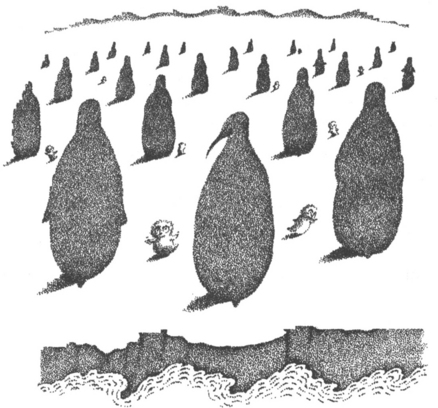
Standing in the blustery Antarctic wind, while a vast city-state of penguins milled noisily around me, I was surprised by everythingthe number of penguins, whose raucous calls blurred into a symphonic screech; the brutality of the cold biting through my jacket; the way my mind obsessed about how penguins view life; the unexpected voluptuousness of the vista. I had always imagined them living among ice palaces in windswept rookeries of monotone white, but I discovered that their world danced with minute prisms. More colorful than a rain forest, snows never-ending white contains all colors, could we but see them. And in such extreme cold one can, which I learned with the force of a revelation. Because the surgical winds were blowing sharp as a scalpel, clouds couldnt form in the frigid air. But suddenly, out of the brilliant blue emptiness, snow began falling in a confetti-sparkle of diamond dust. I was standing inside a kaleidoscope. What did those emperor penguins make of it? I wondered. Or of me, for that matter. After all, their world was half the man-devils and half their own. Clothed in brilliant red parkas, spawned from the sides of a colossal metal fish that floated upon the water, my shipmates and I had arrived to stalk without killing, while gabbling among ourselves, sometimes clicking and clackingtall gangly creatures who stomped slowly through snow and never slid downhill on our bellies, or used beaks as ice picks when climbing a steep slope, or swam fast after catapulting into the sea. We were baritone beings who dragged, drove, wore, and carried an endless array of things. I felt ashamed of my belongingssome objects for survival, but others merely for a sense of connectedness to the known world, a symbolic trail to my past. As my sense of identity began to seep out of me and extend itself to the penguins, I realized that they were the ultimate ascetics, creatures that possessed nothing, nested with nothing, traded nothing, carried nothing but their young.


